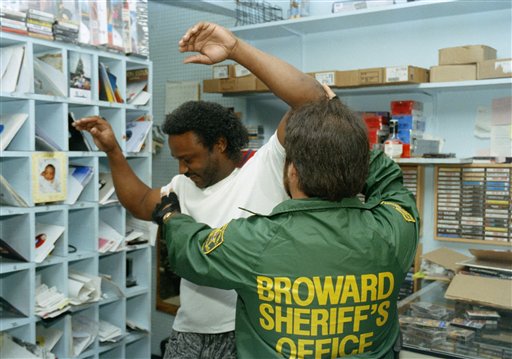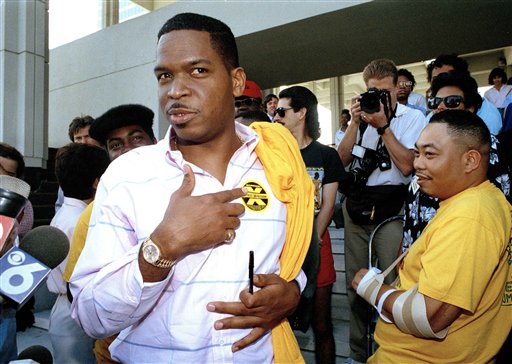In Luke Records v. Navarro, the 11th U.S. Circuit Court of Appeals ruled that an album by the rap group 2 Live Crew was not legally obscene.
The decision stands for the principle that music has serious artistic value and, as such, does not rise to the level of obscenity even if it is filled with profanity and misogynistic language.
Florida sheriff prevented sales of 2 Live Crew album
The controversy began when Broward County, Florida, Sheriff Nick Navarro took actions to prevent record store owners from selling the 2 Live Crew’s album As Nasty As They Wanna Be.

Record shop owner Charles Freeman is grabbed as he is arrested by a Broward detective in Fort Lauderdale, Fla., June 8, 1990. Freeman’s arrest came after he sold a 2 Live Crew album and tape to an undercover detective. The album “As Nasty As They Wanna Be” was declared obscene by a federal judge on Wednesday. (AP Photo/Doug Jennings, used with permission from The Associated Press)
In response, the group — comprised of performers Luther Campbell, David Hobbs, Mark Ross, and Charles Wongwon — filed a lawsuit in federal district court, seeking a declaratory judgment from the court that the album was not obscene and an order from the court enjoining the sheriff from taking further actions limiting the sale of the album.
The federal district court enjoined the sheriff from taking further actions limiting the sale of the album but the court also declared that As Nasty As They Wanna Be was obscene.
The group’s record company, Luke Records (formerly Skyywalker Records) appealed the finding of obscenity to the 11th Circuit. On appeal, a three-judge panel of the 11th Circuit unanimously reversed.
11th Circuit Court said As Nasty As They Wanna Be was protected by First Amendment, not obscene
The 11th Circuit applied the U.S. Supreme Court’s test for obscenity – known as the Miller Test – from Miller v. California (1973).
That three-pronged test focuses on whether the work as a whole, under contemporary community standards:
- appeals to a prurient, or shameful interest in sex;
- depicts sexual materials in a patently offensive way; and
- lacks serious literary, artistic, political, or scientific value.
Sheriff offered no proof that album was obscene
The 11th Circuit was troubled by the fact that the federal district court judge determined the album was obscene himself without a jury. The appeals court also expressed concern that the sheriff at the district court level presented no proof of contemporary community standards, prurient interest, or serious artistic value. The only evidence the sheriff presented was the tape itself.
On the other hand, Luke Records called four expert witnesses, including a psychologist, two music critics, and a Rhodes Scholar who testified to the artistic value of the music. The 11th Circuit relied on this testimony and noted that the Sheriff presented no evidence to refute the expert testimony that the rap album had serious artistic value.
“A work cannot be held obscene unless each element of the Miller test has been met,” the appeals court wrote. “We reject the argument that simply by listening to this musical work, the judge could determine that it had no serious artistic value.”
David L. Hudson, Jr. is a law professor at Belmont who publishes widely on First Amendment topics. He is the author of a 12-lecture audio course on the First Amendment entitled Freedom of Speech: Understanding the First Amendment (Now You Know Media, 2018). He also is the author of many First Amendment books, including The First Amendment: Freedom of Speech (Thomson Reuters, 2012) and Freedom of Speech: Documents Decoded (ABC-CLIO, 2017). This article was originally published in 2009.

